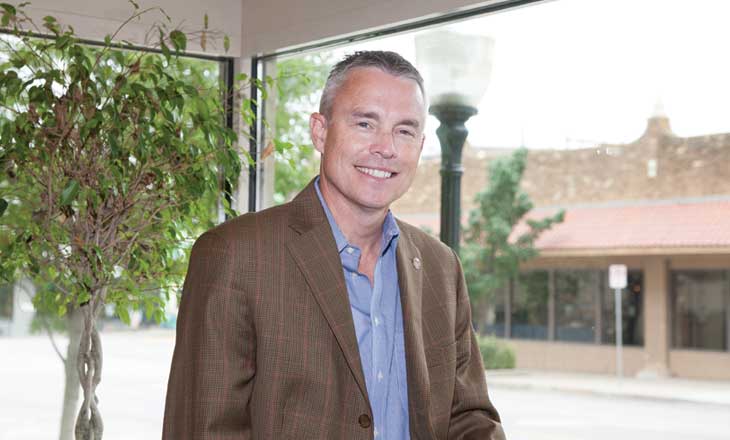| 2013 Fall

What is your company’s most important commodity or service?
GuideWire Consulting provides a wide variety of environmental and building assessment services for clients located throughout the United States. These services are often required as a part of property transactions. Delivering our reports on time, and often with very little advance notice, for a competitive price is what allows us to continue to compete with larger firms.
Other than monetary, what is your company’s most important priority?
Client satisfaction is our top priority. When we are given the opportunity to be involved in a project or business transaction, we deliver our services with a constant sense of urgency.
What has been some of the most important aspects of your success?
Early in the development of our company we focused on harnessing technology to provide the best possible product for the lowest possible cost. This meant utilizing the internet for report production and data assimilation. Embracing technology, and new ways to provide our service allowed us to compete early on with competitors who were slow to adapt to the changing business intelligence environment.
GuideWire also embraced the concept of using affiliate business partners to deliver services locally. Many firms followed a model of building offices and staff in many cities. We focused on building a team of likeminded small business owners and entrepreneurs to help us serve our national clients. By keeping our overhead low, we have been able to withstand the fluctuating economy and remain profitable.
How many people does your business employ?
Our team includes individuals and small business in almost every state. Most of these affiliates work on a per project basis. In some areas where we have more business, we will have multiple groups available to assist with our fluctuating project demand.
How many of those live in Lawrence?
We have three full time employees that live and work in Lawrence. Prior to moving our business to Lawrence, Kansas several of us that commuted to Kansas City on days where we worked in the office. Since most of our projects are located outside the Lawrence and Kansas City market, the location of our staff is less important, and proximity to the projects we are awarded becomes most important for optimum service and profitability.
How do you and your business make a positive impact on the Lawrence community?
We believe one impact we make on the Lawrence community is our ability to bring in dollars from outside the community and infuse those dollars into the local economy. We also pride ourselves on providing needed technical services to the businesses and lending institutions in our area, for a fair price. By providing homegrown technical services to local institutions, we also help keep dollars inside our community.
What do you see as your personal responsibility and your company’s responsibility to the community?
We made the conscious decision to move our business to Lawrence so that our team could work, live and participate in the community. We also made the decision to move our office to downtown Lawrence so that it would be easier to invest ourselves in the daily activities that are available in our central business district. Those decisions have led to several of our team’s active participation in community boards, associations and leadership roles.
What would you change about doing business in Lawrence?
I strive to make Lawrence a great place to do business through my role on the City Commission. Many of the hurdles that I once believed were a hindrance for businesses to prosper in Lawrence have been removed and the climate is improving.
As a consultant in the rapidly changing and growing technology field, how have you managed to remain relevant and profitable? Or, how has your business changed over the years to remain relevant?
We have invested heavily in building technology that allows us to respond faster and write more consistent and comprehensive reports. These investments have had a direct impact on our bottom line. We have also helped others harness technology to streamline their operations. The technological changes that have emerged over the past ten years have allowed the average client and consultant to do more with less time and personnel. From database driven reports to the use of web-based systems for client delivery and management, we have been at the forefront in our industry. However, it is important to remain open to new tools and technology, and we are continuously revaluating the way we do business, and help others to avoid the pitfalls related to standing still as the technology world changes.
How do you manage your day-to-day stress of business?
I was fortunate to get a job in an industry that was directly related to what I care about most and what I studied in college. When you love what you do, it is easy to manage the stress that comes from providing the level of service that you desire and the expectations of your client. Flexibility is important, and an understanding spouse is a requirement. My family has supported my efforts throughout my career, and that has helped me manage business related stress.
How do you reward excellent work performance? How do you manage poor performance?
In our business, the client is the ultimate judge of our work. When we have made our client happy, it is usually rewarded with repeat business. We try to provide the best possible working environment, flexibility of hours and the tools to do your job well. We also provide proper praise and financial incentives when our work is done exceptionally well. Conversely, some people are not able to meet the demands that our clients place upon us, and so those relationships do not usually merit continued investment. Since most of our affiliate consultants work for themselves, or a small business, the business dynamic is different than most companies. We all work for the client and if we do well, we all succeed.
What is the biggest challenge you feel your company faces?
Our business is cyclical, and that means some months we have to turn down projects, and other months we do not have enough business to keep all of our affiliates busy. The structure of our company allows us to manage the highs and lows, but it also means that we must work hard to keep our base of business at a level that everyone has enough to do to keep them financially viable. The other challenge is finding good people who are technically proficient and able to respond rapidly to the clients needs.
Over the course of your career, what has been the single largest change in the Lawrence business environment?
Since most of my business is outside of Lawrence, I do not have great insight from my business experience to share, however in my role as a City Commissioner I can say that I have learned a great deal about our business environment, and how it has changed over the last thirty years. For many years we focused on building homes for people to live in, and less on the businesses that would keep people in the community. As more residents began leaving town for work outside of Douglas County, we lost some of the time and energy of those people that could be invested in our community. We could have done more to allow businesses to grow and prosper in Lawrence. Much effort has been put into changing the recent trend, and I believe with the communities continued investment in local businesses and attracting new businesses, we will be able to reverse the trend.
What do you foresee as being the biggest challenge in the area of environmental technology? On a local level? On a national level?
The biggest challenge in the environmental and building consulting field is keeping up to date on the changing local, state and federal regulations that apply to our business, and the changing business climate that drives the work. Lending institutions have become far more sensitive to and interested in the risks associated with real estate. This means that there is more scrutiny of potential risks associated with a loan or investment. Regulators are also constantly evaluating environmental contamination issues and revising the rules associated with their assessment and remediation. These challenges will continue, but is also creates an opportunity for consulting firms who are able to stay on top of the rules and expectations in the industry to prosper and grow. ■



